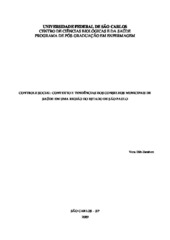Controle social: contexto e tendências dos Conselhos Municipais de Saúde em uma região do Estado de São Paulo
Resumen
The Single Health System (SHS) was implemented in 1988 and it still presents challenges for its empowerment. One of its innovations is the Municipal Health Councils (MHC), but they couple with difficulties for full performance. The analysis of the role of these councils and their participation in the SHS may subside discussions for obeying this constitutional principle. The study developed evaluated the social control in six municipalities of Araraquara Health County, highlighting the organization and functioning of the MHC. Adopting a qualitative approach, data were collected by a documental search in the Araraquara Health County Headquarter and by semistructured interviews with 26 health counselors. The documental analysis was based on federal laws for creation, organization, and routine work of the MHC. The data of interviews were discussed using the following thematic categories: conception of social control, effective role of health counselors, juridical and organizational aspects of the MHC, and effectiveness and perspectives of social control. The Health Councils in the 6 municipalities were created in 1991, and in subsequent years four of them have changed their legal instruments. Only two of them have innovated in some procedures, such as election of the president, mandate non-coincident with local majors, administrative management and implementation of committees. Some council‟s regulations are in disagreement with local and federal laws (for instance, law 8142 and Resolution 333 of the National Health Council), such as the deliberative character, the parity representation of users, internal regiment, a municipal staff in charge of council presidency, and no guarantee of administrative and financial support for routine work. Some counselors do not have a clear knowledge about the meaning of social control as adopted by the SHS. The councils and health conferences are considered a must, but both must be empowered. The action of the counselors denotes a society with limited public involvement. The difficulties to obtain information and the lack of participation in workshops cause a limitation for performing their role. Sometimes these councils are manipulated for legitimating decisions of public health authorities and their administrative and financial organization also limit their autonomy. Despite recognizing the important function of the MHC, their results are below their potentialities. However, advancements can be observed such as the election for president, specific budget for council activities and widening of the opportunities for users‟ feedback by local management councils, meetings in specific boroughs, and discussions about the budget applied in health. One of the biggest challenges is the social demobilization and the need for social control in the SHS. It may be concluded that it is needed the investment in education including formal processes for exerting citizenship and adoption of innovative management practices. The background of public health workers needs adjustments for providing effective dialogue with users. There is also a need for definition of a politics for local social control to guarantee the empowerment of the MHC. Finally, it should also be mentioned the existence of the Management Regional Committee for improving partnerships for SHS social control.
